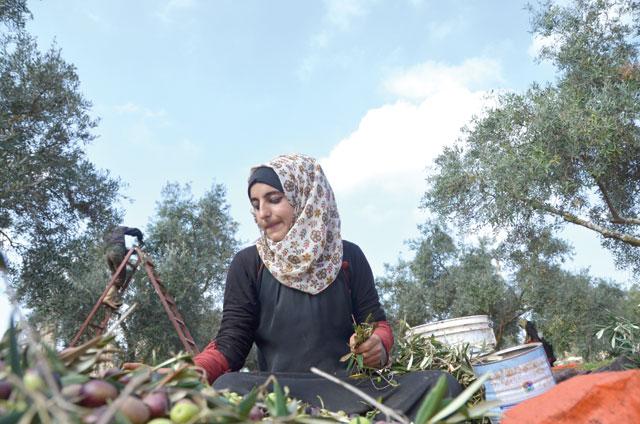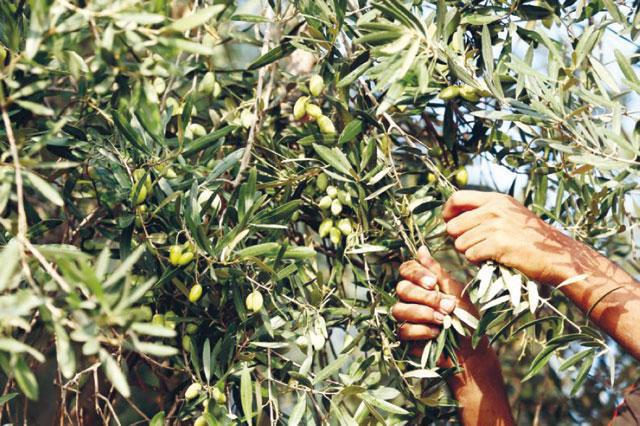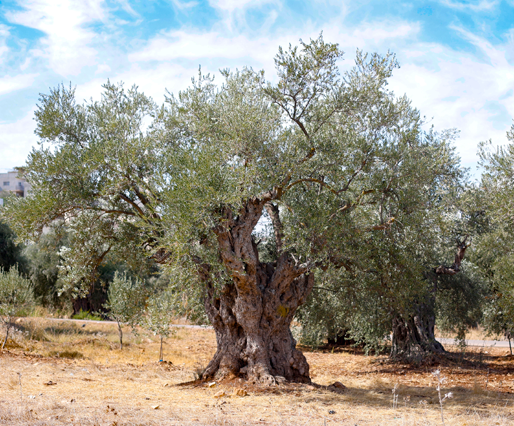You are here
Olive harvest: maintaining centuries-old tradition, special bond with the ‘blessed tree’
By Muath Freij - Nov 27,2014 - Last updated at Nov 27,2014

IRBID – Irbid resident Samiah Mansour waits eagerly for the annual olive harvest season to be able to pay back her debts and make ends meet.
The mother of five said she followed in her forefathers' footsteps in preserving the olive farming tradition, adding that each year, she becomes preoccupied with the autumn job for one-and-a-half months. But luckily, she has for years followed a business practice that has spared her much of the hard work.
"Ever year, I renew an agreement with a contractor who handles the collection of olives for a certain fee. I've been doing this for 15 years," the 45-year-old Mansour told The Jordan Times.
Mansour is among thousands of Jordanian households who rely on the olive crop as a main source of income.
According to one farmer, an average-sized farm of 100 trees can generate around JD4,000 annually. The money can be used, for example, to pay university tuition fees or help a son get married.
More than 80,000 families are directly involved in olive farming and are securing self-sufficiency, Fawzi Shayeb, president of the fifth International Olive Conference (Olive biotech 2014) organising committee recently said, underscoring that olive production generates approximately $145 million in annual income for these families.
Unlike Mansour, many of these are not willing to hire collectors for a slice of the revenues.
According to Ahmad Omari, the manager at an olive press in Irbid's Bani Kinana District, which is famous for the top quality of its produce, many public and private sector employees who own olive farms use their annual leave during the olive harvesting season to collect their olives, oversee the pressing process and market the crop.
Omari said during the high season, his 20 workers do two shifts a day to meet the peak demand.
Hussein Omoush, a columnist at Ad Dustour daily newspaper, suggested in a recent article a three-day paid annual national leave to enable farm owners who have regular jobs to collect olives with the help of family and friends to add a festive social flavour to the tradition, a signature economic activity in the Mediterranean country.
He said that this “will further strengthen the bonds among people and between people and the olive tree”, which is seen in this part of the world as a holy or “blessed” tree.
He said some people might believe annual leaves have a negative impact on productivity, but “people’s productivity hinges more on dedication and attitude rather than on the number of working days”.
Imran Mansour, one of Samiah’s children, said he sometimes takes days off from school to give his mother a hand when harvest time arrives.
“I like working with olives because it helps us meet the needs of my family’s life. This has been my family’s main source of income for ages,” the 16-year-old told The Jordan Times as he was helping collecting olives along with his siblings.
Despite the deal his mother has had with the contractor, he believes that he has to be part of the tradition, which, he suggests, is becoming increasingly unpopular among the younger generation.
“Most people of my age do not like collecting olives, but I like it very much,” he added.
Meanwhile, Agriculture Ministry Spokesperson Nimer Haddadin said this year’s olive production in the Kingdom is not as abundant as last year.
He attributed that to various reasons including the snowstorm that hit the country last year and resulted in great damage to olive trees.
“Around 25,000 tonnes of olive oil is expected to be produced this year, compared with around 32,000 tonnes produced last year,” he said.
But regardless of setbacks like these, Imran wants to keep this special relationship with the olive tree a cross-generation bond.
Related Articles
AMMAN — As the olive harvest season gets underway, significant numbers of citizens and residents are flocking to farms and mills to experien
AMMAN — Early olive harvest has become a strategic method of turning profits before the official beginning of the olive oil season, accordin
AMMAN — The impact of climate change on temperatures and precipitation patterns in Jordan has led to delays in the flowering and fruit


















